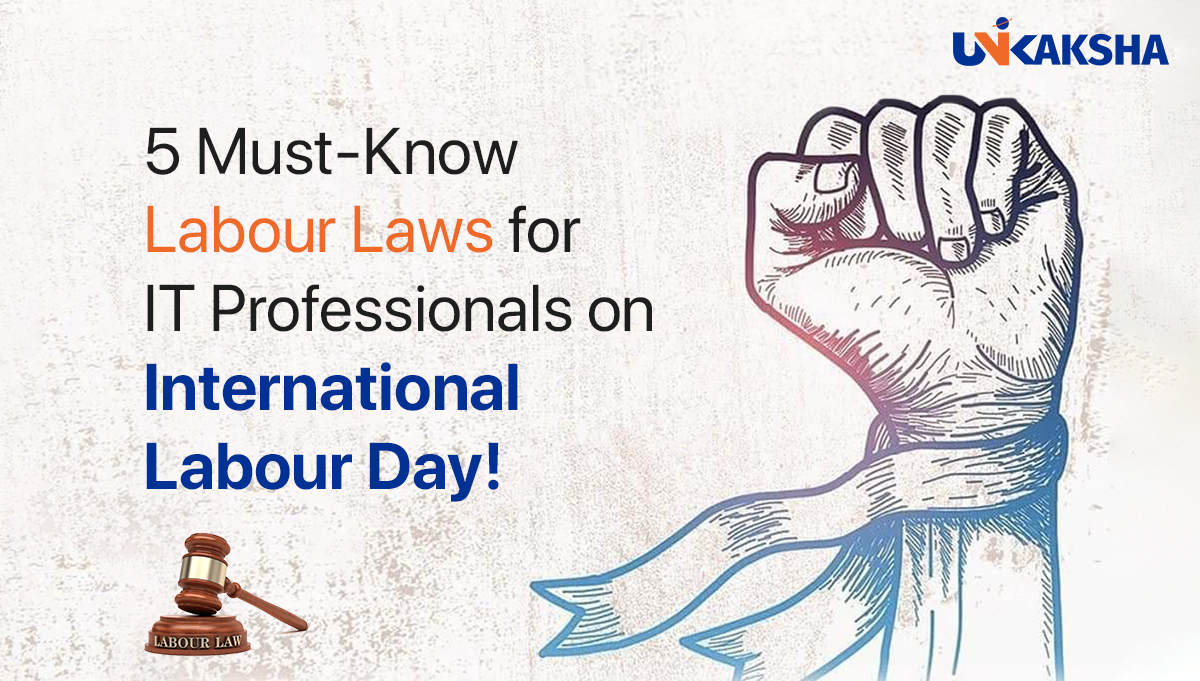5 Must-Know Labour Laws for IT Professionals on International Labour Day!

Calling all IT professionals!
Did you know that you could be entitled to labour laws, even though the IT industry has traditionally been exempt from such regulations? The Industrial Employment Standing Orders Act, 1946 has not typically applied to IT companies, but new government regulations have changed the game.
In honor of International Labour Day, we want to educate you about the 5 major labour laws that can benefit you during this challenging period of economic downturn. Don’t miss out on these crucial labour laws insights that could potentially transform your professional life!
5 Labour laws in IT/ITes industries⚖️:
1. Trade Unions Act (1926):
The Trade Unions Act gives the right to Indian citizens to form and join unions. This act enables employees to collectively bargain with employers and negotiate better wages, benefits, and working conditions.
The IT industry has seen a significant rise in unionisation in recent years, with many IT employees forming unions. Some examples of these trade unions are Karnataka State IT/ITES Employees Union, Forum for IT Employees (FITE), NDLF-IT (New Democratic Labour Front-IT), Indian IT Workers Association (ITWA).
These trade unions help IT employees demand better working conditions, job security, and fair compensation.
2. Payment of Wages (1936):
The Payment of Wages Act mandates that employers must pay their employees in a timely and accurate manner. In case of any delay, the employer must provide a valid reason for the delay.
The Payment of Wages Act also lays down the rules regarding the deductions that can be made from an employee’s wages. Deductions are allowed for specific purposes, such as income tax, provident fund, and insurance.
In the IT industry, where employees work on tight schedules and deadlines, timely payment of wages is essential to maintain a stable work environment. The Payment of Wages Act ensures that employees are paid on time and can focus on their work without worrying about their financial stability.
3. Payment of Gratuity (1948):
The Payment of Gratuity Act mandates that employers provide a gratuity payment to employees who have completed a minimum of five years of continuous service. This act ensures that employees receive a lump sum payment upon retirement or resignation, which can help provide financial security during their post-retirement years.
The IT industry, like any other industry, has a significant turnover rate, and this act ensures that employees who have completed a significant amount of time with an employer receive a gratuity payment.
4. Maternity Benefit (1961):
The Maternity Benefit Act of 1961 is one of the most important labour laws. It provides expectant mothers with up to 26 weeks of paid leave, which they can take either before or after giving birth.
The IT industry in India is known for its highly skilled workforce, and it employs a large number of women. However, the industry has traditionally been male-dominated, and female employees often face discrimination and bias in the workplace. The Maternity Benefit Act helps to address some of these issues by providing female employees with the necessary time off to recover from childbirth and adjust to their new roles as mothers.
The act also helps to promote gender equality in the workplace by ensuring that female employees are not disadvantaged for taking time off to have children.
5. The Sexual Harassment of Women (Prevention, Probation, Redressal) (2013):
This act defines sexual harassment and provides a comprehensive framework for preventing and addressing such incidents in the workplace. It mandates the formation of Internal Complaints Committees (ICC) in every workplace with more than ten employees, and these committees are responsible for addressing complaints related to sexual harassment.
The IT industry has a large number of female employees, and this act has helped in creating a safer and more inclusive workplace culture for them. The act has brought greater awareness about sexual harassment and has made it mandatory for employers to take steps to prevent and address such incidents.
Employers are required to conduct awareness programs and sensitization training to ensure that all employees are aware of their rights and responsibilities regarding sexual harassment. The act also provides for strict penalties for non-compliance, which has made employers more vigilant in preventing sexual harassment in the workplace.
Assuming you are a working professional in the IT industry, since you have made it this far into reading this blog, we would like to introduce you to Unikaksha. Our online platform assists students and working professionals in learning Full stack web development and advancing their skillset. We offer four flexible payment plans so that you can select the most suitable course for your needs. Enroll with Unikaksha now to benefit from incredible offers and receive discounts on any course of your choosing.
About the Author
Luqmaan Shaik serves as the Blog Specialist at Unikaksha, where he leads a team of technical writers dedicated to researching and providing valuable content for blog readers. With a wealth of experience in SEO tools and technologies, his writing interests encompass a wide range of subjects, reflecting the diverse nature of the articles. During his leisure time, he indulges in an equal balance of web content and book consumption.
 Related Posts
Related Posts
|
Offerings
|
FutureFirst
|
SmartStart
|
GradEdge
|
SelfMastery
|
|---|---|---|---|---|
|
Doubt clearing session
|
                                          |
                                          |
                                          |
                                          |
|
No of job opportunities
|
15 | 25 | 15 | 3 |
|
Course Access
|
5 Years | Lifetime | Lifetime | 5 Years |
|
Free Library Courses
|
                                          |
                                          |
                                          |
                                          |
|
Job Assurance
|
                                          |
                                          |
                                          |
                                          |
|
Language
|
English/Hindi | 5 Language options | English/Hindi | English/Hindi |
|
Live classes
|
100% | 100% | 100% |                     |
|
Offline
|
                                          |
                                          |
                                          |
                    |
|
Industry Expert Sessions
|
                    |
                                          |
                    |
                    |
|
Internship (IOP)
|
                                          |
Guaranteed | Guaranteed | Based on evaluation |
|
1:1 Mentoring sessions
|
                    |
                                          |
                    |
                    |
|
Customer Support
|
                                          |
                                          |
                                          |
                                          |
|
Dedicated Program Manager
|
                    |
                                          |
                    |
                    |
|
Opt for Placement services
|
Compulsary |                                           |
                                          |
                                          |
|
Career Support
|
1 Year | 18 Months | 1 Year | 3 Months |
|
Regular assessments
|
                                          |
                                          |
                                          |
                                          |
|
Report cards
|
                                          |
                                          |
                                          |
                    |
|
Career Guidance
|
                                          |
                                          |
                                          |
                    |
|
Certificates
|
                                          |
                                          |
                                          |
                    |
|
Scholarship
|
                                          |
Available | Available |                     |
|
Trial Class
|
1 week | 1 week | 1 week |                     |
|
Outside placement
|
Paid | Allowed | Allowed | Allowed |
|
Premium Jobs
|
                    |
                                          |
                    |
                    |
